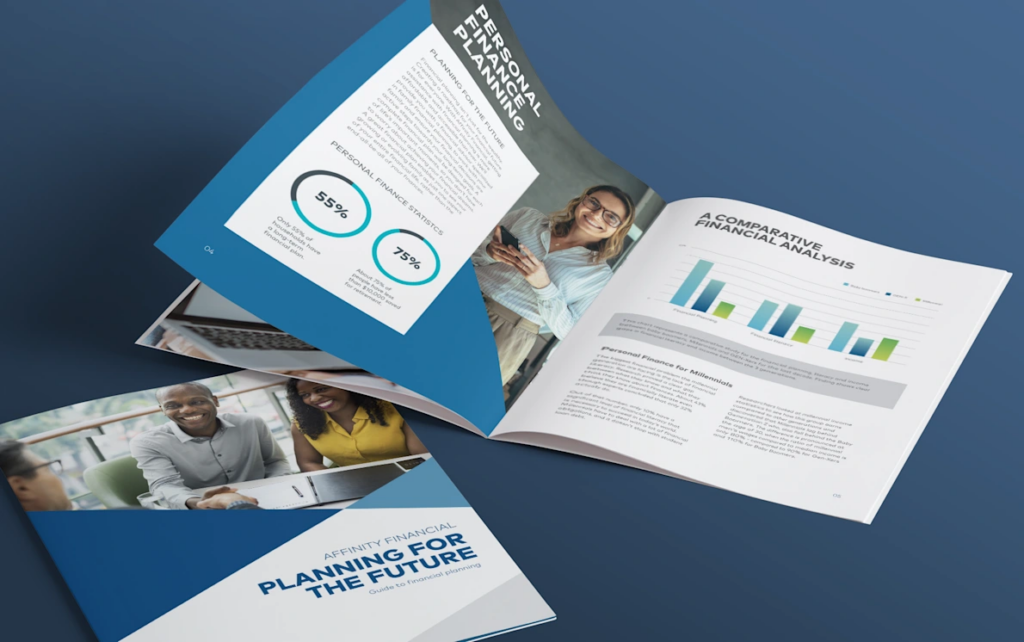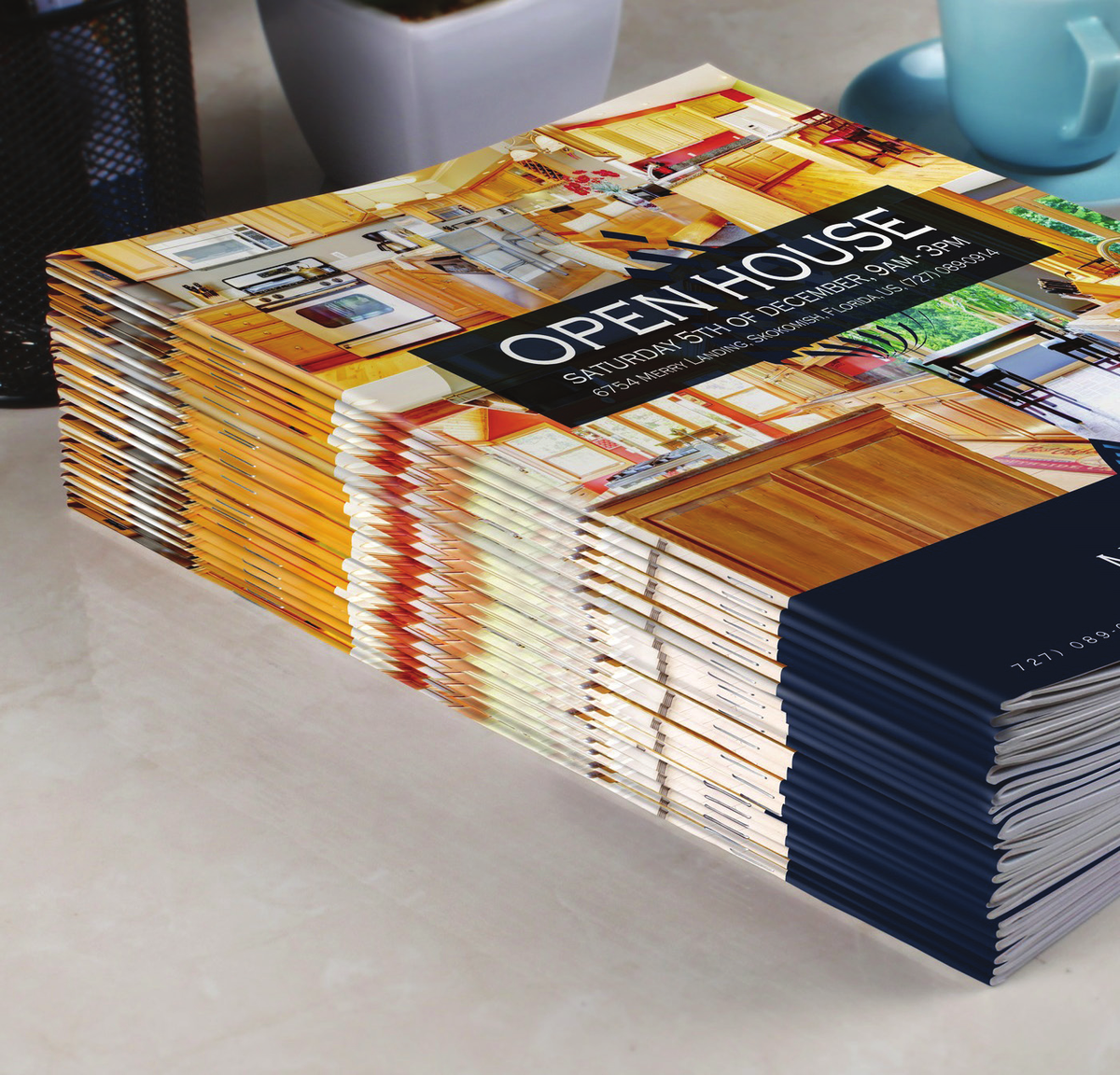Creative Finishing Techniques That Elevate Your Booklet Printing Results
Wiki Article
The Important Guide to Comprehending Brochure Printing Options and Techniques
The procedure of brochure printing involves several considerations that can significantly influence the final item. From picking the appropriate format and dimension to recognizing the nuances of binding techniques, each choice plays an important function. Additionally, factors such as paper supply and printing techniques additional influence the performance of the pamphlet. As one navigates these choices, it comes to be important to realize how they interconnect and what that suggests for the general outcome.Understanding Booklet Sizes and formats
When taking into consideration brochure printing, recognizing the numerous styles and sizes readily available is crucial for accomplishing the desired discussion. Booklets can be created in many styles, including saddle-stitched, spiral-bound, and perfect-bound, each offering distinctive advantages. Common dimensions range from basic letter (8.5 x 11 inches) to smaller sized options like A5 (5.8 x 8.3 inches), enabling adaptability based on material and target audience.Selecting the suitable dimension can affect both the format and visitor interaction. Bigger dimensions may match aesthetically driven material, while smaller sized layouts may be a lot more straightforward and mobile. In addition, the variety of web pages influences the selection of binding approach, as thicker brochures might call for stronger bindings. Ultimately, understanding these aspects permits a much more tailored method, ensuring that the end product straightens with the desired message and aesthetic, boosting the overall performance of the interaction.Selecting the Right Paper Stock

Binding Techniques: Considerations and options
When it concerns binding techniques for pamphlets, numerous alternatives are available, each with distinct advantages. Saddle stitch binding provides an economical remedy for thinner pamphlets, while perfect binding techniques offer a more polished seek thicker publications. Wire-O binding stands apart for its toughness and convenience of usage, making it excellent for records that call for adaptability.Saddle Stitch Binding
Saddle stitch binding supplies a cost-effective and practical solution for assembling pamphlets, making it a preferred option amongst companies and publishers. This binding method involves folding sheets of paper in fifty percent and stapling them along the fold line, developing a cool and orderly look. Commonly ideal for pamphlets with a lower page matter, saddle sewing is optimal for magazines, brochures, and educational products. The simplicity of this strategy permits for quick production and is usually preferred for marketing items or brief runs. It is crucial to keep in mind that saddle stitch binding may not be appropriate for thicker booklets, as the back may not hold up under raised weight. Generally, it remains a dependable alternative for lots of printing projects.Perfect Binding Methods
Perfect binding is a widely utilized technique that supplies a polished and expert coating to booklets and magazines. This approach involves gluing the pages with each other at the spine utilizing a solid adhesive, permitting a tidy side and the ability to hold a bigger variety of pages compared to saddle sewing. Perfect binding is particularly appropriate for thicker pamphlets, such as catalogs and annual records, where a sturdy, flat spinal column is wanted. Additionally, it provides the alternative for a published cover that can be made to enhance aesthetic allure. However, considerations such as page matter, paper weight, and the intended use the pamphlet ought to be taken into consideration, as they can influence resilience and general top quality.Wire-O Binding Options
Wire-O binding, known for its resilience and versatility, uses an exceptional alternative for pamphlets that call for very easy web page transforming and an expert appearance. This binding technique utilizes a series of metal loopholes that hold web pages firmly, permitting them to exist flat when open. It is especially suitable for handbooks, presentations, and brochures because of its robust nature. Wire-O binding is readily available in numerous colors and diameters, suiting various page matters and densities. Furthermore, it permits the incorporation of covers and tabs, enhancing the brochure's overall visual. Factors to consider for Wire-O binding include the selection of cable color, the dimension of the loops, and the extent of modification preferred, all of which can greatly influence the end product's appearance and performance.Digital vs. Offset Printing: Which Is Best for You?
When selecting a printing technique for brochures, understanding the distinctions between electronic and balance out printing is important. Digital printing makes use of contemporary innovation to create top quality prints promptly and economically, making it ideal for brief runs or projects needing fast turnaround times. It enables personalization, giving the capability reference to publish on-demand with minimal waste.In comparison, offset printing is a standard approach that masters generating large quantities with regular quality. It includes moving ink from a plate to a rubber blanket, then to the paper, which causes dynamic colors and specific details. However, balance out printing commonly requires longer configuration times and is extra cost-effective for larger volumes.Ultimately, the selection in between digital and offset printing depends upon task needs, budget, and desired quantity. For little, time-sensitive jobs, electronic could be the ideal selection, while countered might be preferable for larger, top quality productions.
Creating Your Pamphlet: Tips and Ideal Practices
When creating a booklet, careful focus to format, typeface selection, and shade use can substantially boost its effectiveness. A well-structured design guides the reader's eye, while ideal typefaces ensure readability and convey the wanted tone. Furthermore, effective usage of shade can evoke feelings and highlight key info, making the overall layout a lot more impactful.Choosing the Right Format
Exactly how can one effectively select the best format for a brochure? It is necessary to evaluate the brochure's purpose and target audience. A tidy, arranged design boosts readability and engagement. Making use of a grid system can aid in straightening elements constantly, creating an expert look. Additionally, integrating aesthetic pecking order via varying sizes and positionings of images and text can assist the reader's eye and highlight vital information. It is likewise essential to leave sufficient white area, which stops congestion and permits much better emphasis. Examining different layouts through mock-ups can offer understanding right into just how the layout executes in real-world circumstances, making certain that the last item satisfies both visual and useful needs. Useful Picking Ideal Font Styles A well-chosen font style can considerably enhance the overall design of a booklet, complementing the layout and reinforcing the web content's message. The option of typefaces need to take into consideration readability, specifically for body message, as it ensures the info is easily accessible to all visitors. Sans-serif font styles are typically chosen for digital formats, while serif typefaces can offer a standard feel in printed products. It's advisable to limit font selections to 2 or three to maintain aesthetic coherence. Additionally, typeface dimension plays a crucial role; headings should be distinctive however not overwhelming, while body message right here must fit for analysis. When choosing fonts, placement with the brochure's theme and target market is necessary for efficient interaction and visual appeal.Reliable Use of Shade
Color functions as a powerful device in pamphlet style, directing and forming perceptions visitor feelings. It can evoke feelings of trust fund, excitement, or calmness, depending on the shades picked. Developers should think about shade concept concepts, ensuring that the chosen combination aligns with the booklet's message and target audience. For circumstances, making use of cozy colors like red and orange can produce necessity, while cooler tones like blue and eco-friendly foster tranquility.Additionally, comparison plays an essential duty; complementary colors can enhance readability and visual charm. Consistency in shade use throughout web pages additionally reinforces brand name identification and cohesion. Eventually, efficient color implementation not only records focus yet additionally enhances the brochure's function, making it a necessary element of successful design.
Finishing Touches: Coatings and Unique Results
While lots of think about the material and layout of a brochure the most crucial elements, the ending up touches, such as layers and unique impacts, play an important role in boosting its general appeal. Coatings can provide defense and longevity, making certain that the brochure withstands damage. Matte surfaces provide an innovative, non-reflective surface area, while glossy layers can make shades appear even more distinctive and lively. Special impacts, like embossing or foil marking, add a responsive dimension that can produce a memorable impression. These techniques can highlight details areas, accentuating vital info or developing visual passion. Furthermore, UV layer can provide a high-shine coating that raises the general look.Together, these ending up touches not only boost the brochure's visual but likewise connect professionalism and trust and attention to detail, inevitably leaving a long lasting effect on the reader.Expense Factors To Consider for Booklet Printing
Comprehending the various expense factors to consider for booklet printing is vital for businesses and organizations intending to optimize their budget plans. Secret variables influencing costs include the option of paper, ink, and binding methods. Higher high quality products, such as exceptional paper or specialized inks, typically enhance the general cost. Furthermore, the dimension and web page matter of the pamphlet play a substantial duty; bigger pamphlets call for even more sources and time to produce.Another vital factor to consider is the printing technique, whether electronic or countered, as each has its very own rates framework and viability for various amounts. Services must likewise consider style expenses, which can vary based on complexity and the usage of specialist solutions. Eventually, delivery and handling charges can add to the total, especially for huge orders. By reviewing these components, companies can make educated decisions that align with their economic capacities while accomplishing the preferred quality in their printed materials.Frequently Asked Questions
What Are the Ecological Effects of Brochure Printing?
The environmental influences of booklet printing consist of logging from paper production, carbon exhausts from transport, and waste generation from thrown out products - Booklet Printing. Lasting methods, such as using recycled paper and green inks, can alleviate these effectsExactly How Can I Guarantee Shade Accuracy in My Booklet?
To assure shade accuracy in a pamphlet, one must utilize adjusted screens, use expert color accounts, conduct examination prints, and select high-quality printing solutions that offer shade matching and proofing options for ideal results.What Is the Regular Turnaround Time for Pamphlet Printing?
The common turn-around time for brochure printing differs depending on the intricacy and quantity - Booklet Printing. Normally, it ranges from a few days to 2 weeks, influenced by variables such as printing techniques and ending up demandsExist Minimum Order Quantities for Booklet Printing?

Can I Print Booklets in Several Languages?
Publishing booklets in several languages is feasible. Numerous printing solutions supply choices for multilingual or multilingual designs, enabling for reliable communication. Cautious preparation guarantees that develop components accommodate different languages without endangering readability or visual appeals. Furthermore, variables such as paper supply and printing techniques additional influence the performance of the pamphlet. When considering booklet printing, understanding the numerous layouts and dimensions offered is vital for accomplishing the desired presentation. When choosing a printing method for booklets, recognizing the distinctions between digital and counter printing is crucial. In addition, the size and page count of the brochure play a substantial role; larger pamphlets need more sources and time to produce.Another vital factor to consider is the printing method, whether electronic or countered, as each has its own pricing framework and suitability for various Go Here amounts. The environmental influences of brochure printing include logging from paper production, carbon exhausts from transportation, and waste generation from discarded products.Report this wiki page